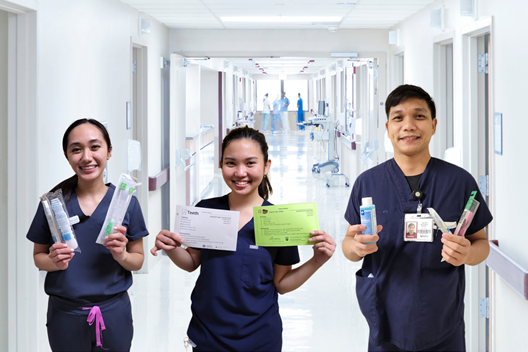April is National Oral Health Month, a month-long event that encourages Canadians to have a better quality of life through better oral health habits.
For most of us, brushing our teeth is an integral part of our daily routine. It helps prevent tooth decay and gum disease. And a clean mouth helps us feel good about ourselves.
That simple ritual isn’t always available for elders in hospital, especially if they aren’t capable of brushing their own teeth.
Kathy Le, a clinical nurse educator at the St. Paul’s Hospital Acute Care for Elders (ACE) unit, saw first-hand the impact of poor dental hygiene on many of the patients.
Oral care can get overlooked
“The ACE unit is very busy and the nurses are stretched quite thin. They know oral care is important, but it often moves down the list as nurses prioritize assessments, medications, toileting and other patient care needs,” says Le. “Research has shown the negative impact of poor oral care on patients and I wanted to do something to make it easier for nurses to prioritize it.”
With that in mind, Le brought together a multidisciplinary team to apply for a Providence Health Care Research Challenge award. They were successful, receiving funding for a project aimed at improving oral care on the ACE unit, decreasing the risk for adverse health-care events, and improving patient health outcomes, satisfaction, and quality of life. The team is made up of two nurses, a speech language pathologist, a dietician, two staff from the UBC Geriatric Dentistry Program and a patient partner.
Oral bacteria can cause other health problems in hospitalized elders
“In a hospital setting, the mouth can become home to disease-causing bacteria,” says Julie Carleton, registered nurse, professional practice leader and research team member. “These bacteria can cause inflammation, mouth sores and discomfort that may lead to an elderly person not eating or drinking. They also may have more difficulty speaking which can reduce their interactions with others. If the bacteria end up in the lungs, they can cause pneumonia and if they are swallowed, they can cause gastrointestinal infections.”
Oral bacteria are one of the main causes of hospital-acquired pneumonia (HAP), a condition that can be prevented through more consistent and thorough oral care. HAP can increase a patient’s length of stay by 15 days and increase mortality rates by more than 18 per cent. In addition to pneumonia, bacteria in the mouth have also been linked to cardiovascular disease and chronic obstructive pulmonary disorder.
“Often, my colleagues and I are brought in when patients develop problems speaking or swallowing,” says the team’s speech language pathologist, Andrea Lau. “Sometimes those problems are caused by excess bacteria in the mouth that end up in the throat or lungs. That’s why I was thrilled to have this opportunity to work with Kathy and the rest of the team to help minimize hospital-acquired pneumonia and other negative health outcomes.”
Feeling like a person, not just a disease
Le and her team knew that better oral care would lead not only to improved health outcomes, but it would also help patients feel better and have a better experience in hospital. To make sure the patient perspective was represented on the project, Le reached out to Melanie Reid, a Vancouver woman with lived experience of long-term hospital stays, and an active patient partner at St. Paul’s Hospital.
“Having someone wash your face, brush your teeth and comb your hair makes you feel like a person again and not just a disease,” says Reid. “These familiar routines are really comforting and supportive. They tell me the nurse thinks I will get better; they believe I am worth keeping clean and ready for the next day.”
The Oral Care Program
The team surveyed staff to understand what they knew about oral care. Lau provided in-services to address gaps in knowledge. The unit was also stocked with geriatric-appropriate oral care products, provided printed resources, and an oral care plan program, where each patient received an individualized oral care plan.
Part of the oral care program included training up 38 oral care champions for 9CD. These champions include eight patient care aides, nine Licensed Practical Nurses, 14 registered nurses, one physiotherapist, four rehabilitation assistants, and two speech language pathologists. An oral care culture has developed on the ACE unit, and the oral care champions have ongoing support through a WhatsApp group with each other and the UBC oral hygiene educator Karen Hopkins.
Program results in triple the amount of oral care
A chart review showed a relative increase of three times the amount of oral care provided and charted, after the oral care program was introduced.
“This is significant,” says Le. “Before this program, documentation rarely occurred. We were excited if a patient had in their chart even oral care being done once a day.”
Patients were also interviewed; analysis of these interviews is currently underway.
Feeling normal and valued
“We hope that our patients receive more regular oral care and that they have a better experience while in hospital. We also want our nurses to feel confident and supported in providing oral care,” says Le.
Reid couldn’t agree more. “I believe it is important to encourage nurses to do research, they have a different perspective on care than doctors,” she says. “Good nursing makes you feel like a normal and valued person again.”
A version of this story originally ran in 2021.





